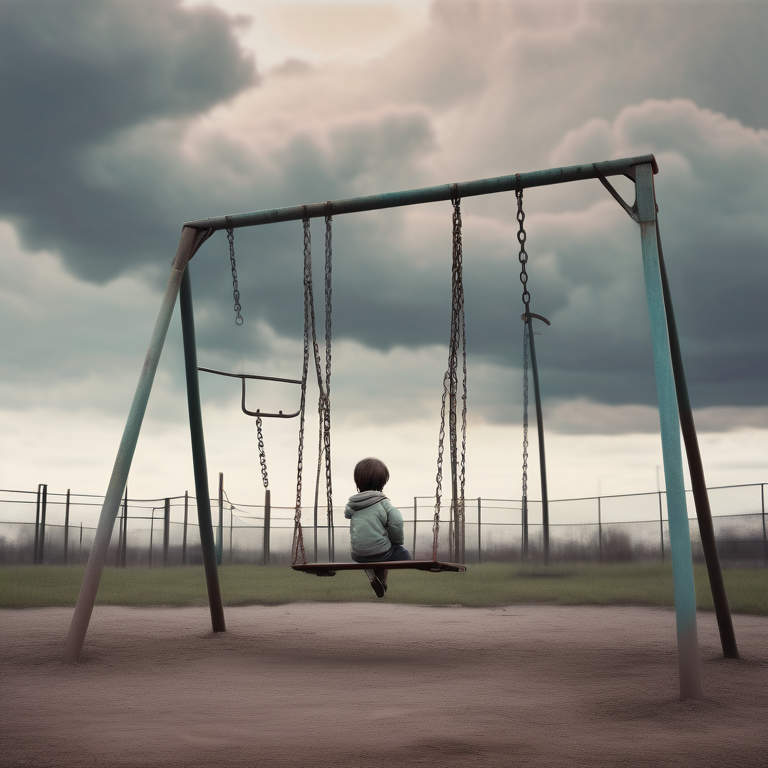Exploring Childhood Trauma: Orlando Counselor
Childhood trauma is a pervasive issue that affects millions of children worldwide. Traumatic events experienced in childhood can have long-lasting effects on a person’s physical and mental health. While children are often seen as resilient, it is crucial to recognize the impact of traumatic experiences on their overall well-being. In this blog, we will explore the topic of childhood trauma and its effects, as well as the role of caregivers and professionals in supporting children who have experienced trauma, as defined by the National Institute of Mental Health.
Understanding Childhood Trauma
Childhood trauma refers to an event or series of events that a child experiences or witnesses that evoke fear and can be violent, dangerous, or life-threatening. It is also known as child traumatic stress or adverse childhood experiences (ACEs). Childhood trauma is unfortunately common, with an estimated 46% of children experiencing trauma at some point in their young lives.
Children, especially young children, are particularly vulnerable to the effects of traumatic events. Their brains are still developing, and they rely on their experiences to understand the world around them. Traumatic events can disrupt this development and shape their adult personality. It is essential to recognize when a child may need the help of a mental health professional trained in evidence-based trauma treatment to deal with their trauma and provide early intervention to prevent the ongoing effects on a child’s brain into adulthood.
The Psychological Repercussions of Early Trauma
Childhood trauma can have significant psychological repercussions. The experience of traumatic stress in childhood can lead to the development of mental health conditions such as depression, anxiety, and post-traumatic stress disorder (PTSD). Children who have experienced trauma may struggle with emotional distress, have difficulty focusing, and experience changes in their behavior, such as increased aggression or withdrawal. These adverse experiences can also have long-term physical health impacts, as the stress can impair the development of their immune and central nervous systems, making it harder to achieve their full potential.
A 2015 study published in the American Journal of Preventive Medicine reports that the more adverse experiences a child has, the higher their risk of chronic disease later in life, making trauma a significant risk factor for nearly all behavioral health and substance use disorders. Understanding the psychological and physical impacts of childhood trauma is crucial for providing effective support and treatment for those who have experienced it.
It is crucial to address and treat these psychological repercussions early on to prevent further negative impacts on a child’s mental health. Mental health services, including therapy and counseling, can provide the necessary support and interventions for children who have experienced trauma.
Recognizing Signs of Trauma in Different Age Groups
Recognizing the signs of trauma in different age groups is essential for early intervention and support. Young children may exhibit signs of traumatic stress through changes in their behavior, such as regressing to earlier developmental stages or displaying excessive fear or anxiety. Older children may experience difficulties in school, exhibit signs of depression or anger, or engage in risky behaviors depending on their child’s age and developmental level.
Caregivers and professionals play a crucial role in identifying these signs and providing the necessary support and intervention. By recognizing and addressing the signs of trauma, children can receive the help they need to heal and develop resilience.
Types of Childhood Trauma
Childhood emotional and physical abuse, including sexual abuse, are common types of trauma that can have a significant impact on a child’s well-being. Bullying and community violence, which can lead to traumatic stress and mental health problems such as suicidal ideation, are also important types of trauma to address. Additionally, disasters and separation, such as natural disasters or the loss of a loved one, can trigger traumatic stress reactions.
Understanding the different types of childhood trauma is essential for providing appropriate support and intervention for children who have experienced these events.
Emotional and Physical Abuse: Impact and Recovery
Emotional and physical abuse have a profound impact on a child’s psychological and physical well-being. Children who experience emotional abuse may develop low self-esteem, difficulty trusting others, and issues with emotional regulation. Physical abuse can lead to physical injuries and long-term health problems.
Recovery from emotional and physical abuse requires a comprehensive approach that includes therapy, support networks, and access to mental health services. Creating a safe and nurturing environment is crucial for healing and promoting resilience in survivors of abuse.
The Lasting Effects of Bullying and Community Violence
Bullying and community violence are traumatic experiences that can have lasting effects on a child’s mental health and well-being. Children who are victims of bullying may experience increased anxiety, depression, and social withdrawal. Exposure to community violence can lead to behavioral problems, post-traumatic stress symptoms, and difficulties in school.
Addressing the lasting effects of bullying and community violence requires a multi-faceted approach that includes mental health support, school-based interventions, and community-wide initiatives to promote safety and well-being.
Coping with the Aftermath of Disasters and Separation
Disasters, such as natural disasters, and experiences of separation can be traumatic for children. These events can trigger traumatic stress reactions, including fear, anxiety, and difficulty coping. Children who experience traumatic events may exhibit changes in behavior, such as sleep disturbances, withdrawal, or heightened emotional responses.
Coping with the aftermath of disasters and separation requires a supportive environment that provides stability, emotional support, and access to resources. Helping children develop coping strategies and providing therapeutic interventions can promote resilience and aid in the recovery process.
The Role of Family and Caregivers
Family and caregivers play a vital role in supporting children who have experienced trauma. Creating a supportive environment emphasizing safety, trust, and open communication is crucial for a child’s healing and recovery. Positive reinforcement, consistent routines, and validation of the child’s emotions can help foster resilience and promote a sense of security. Additional resources and support can also be found through national institutes such as the National Child Traumatic Stress Network and the U.S. Department of Health and Human Services.
Strategies for Creating a Supportive Environment
Creating a supportive environment for children who have experienced trauma involves several strategies. Positive reinforcement, such as praise and rewards for appropriate behavior, can help build self-esteem and promote healing. Creating consistent routines and clear expectations can provide stability and safety. Family members and caregivers can also seek professional help, such as therapy or counseling, including family therapy, to better understand and support the child’s needs.
Importance of Positive Reinforcement and Security
Positive reinforcement and security are essential components of healing and recovery for children who have experienced trauma. By providing positive reinforcement through praise, rewards, and validation of their emotions, caregivers and family members can help build the child’s self-esteem and resilience. Creating a secure and stable environment that emphasizes safety, trust, and open communication is crucial for a child’s healing and overall well-being. Protective factors, such as a supportive family, can help mitigate the effects of traumatic experiences and promote positive outcomes.
The Journey to Resilience and Recovery
Recovery from abuse or bullying is a journey that requires resilience, support, and effective treatments. By understanding and addressing the impacts of trauma, children can develop emotional strength and adaptability, enabling them to overcome the challenges they face. Success stories of childhood trauma survivors highlight the potential for resilience and recovery, including the use of trauma-informed therapies such as cognitive processing therapy, trauma-focused cognitive behavioral therapy, acceptance and commitment therapy, and eye movement desensitization and reprocessing. These therapies offer hope and healing.
Building Emotional Strength and Adaptability
Building emotional strength and adaptability is crucial for children who have experienced trauma. Resilience can be developed through therapy, counseling, and the support of caring adults. By helping children develop healthy coping strategies, problem-solving skills, and emotional regulation techniques, caregivers and professionals can promote emotional strength and adaptability. Effective treatments, such as cognitive-behavioral therapy, can provide the necessary tools and support for children to navigate the challenges they face.
Success Stories: Overcoming Childhood Bullying or Abuse
Success stories of childhood trauma survivors provide inspiration and hope for those who have experienced trauma. These stories highlight the resilience and strength of individuals who have overcome significant challenges and achieved personal growth. By sharing these stories, we can encourage others to seek help, find support, and believe in their ability to heal and recover from childhood trauma.
Long-Term Effects of Unaddressed Childhood Trauma
Unaddressed childhood trauma can have long-term effects on a person’s mental health, socioeconomic status, and overall well-being. The impacts of childhood trauma can extend into adulthood, leading to mental health challenges, substance abuse, and difficulties in forming and maintaining relationships. Socioeconomic impacts, such as lower educational attainment and economic instability, can also be a result of childhood trauma. Additionally, research shows that child trauma survivors are more likely to experience learning problems, increased use of health services, and other negative outcomes. It is crucial to address and support child trauma survivors to prevent these long-term effects.
Mental Health Challenges in Adulthood
Adults who have experienced childhood trauma may face various mental health challenges, including depression, anxiety disorders, substance use, and post-traumatic stress disorder (PTSD). These challenges can have a significant impact on a person’s mental health and can be particularly challenging for young people. It is crucial for young survivors to seek professional help and support to address these mental health challenges effectively.
The Socioeconomic Impacts of Childhood Trauma
Childhood trauma can have significant socioeconomic impacts on individuals and communities. Adverse childhood experiences can lead to lower educational attainment, reduced employment opportunities, and economic instability in adulthood. The long-term effects of childhood trauma can result in a cycle of poverty and decreased access to resources and opportunities. Addressing the socioeconomic impacts of childhood trauma requires comprehensive interventions, including access to education, job training, and social support programs.
Conclusion
Childhood trauma can have profound effects on an individual’s mental well-being and overall quality of life. It is crucial to recognize the signs of trauma across different age groups to provide timely support and intervention. By understanding the lasting impacts of abuse, bullying, or disasters, we can work towards creating a supportive environment that fosters resilience and recovery. Positive reinforcement, security, and emotional strength play significant roles in the healing journey. Addressing childhood trauma is essential to prevent long-term mental health challenges and socioeconomic implications. Parents must be vigilant in identifying signs of trauma in children to offer the necessary care and support for a brighter future ahead.
Call our In-person and Virtual Child or Teen Trauma Counselors in Orlando for help now at 407-248-0030! We also have teen counselors near Altamonte in Winter Park, Lake Mary, Clermont, East Orlando Waterford Lakes Avalon Park, and Dr Phillips Windermere. We also help with EMDR therapy for anxiety and trauma and treat ADHD often without medication and the News Media called us 200+ times for our mental health advice.
Frequently Asked Questions
How Can Parents Recognize Signs of Trauma in Their Children?
Parents can recognize signs of trauma in their children by observing changes in their behavior, such as trouble sleeping, increased fear or anxiety, and disruptions in daily life. Seeking professional help is important for a comprehensive assessment and appropriate interventions.
Helpful Childhood Trauma Resources
Child Abuse Prevention
Filed in: Anxiety, Blog, Bullying, Bullying in the School, Bullying Tips | Parents & Students, EMDR, Orlando, Pedro Michael Valdez IV, Post Traumatic Stress Disorder (PTSD), self-esteem, Sexual Abuse, Teens
Share This Story, Choose Your Platform!
Total Life Counseling Center consists of Licensed Counselors, masters level therapists, Español counselors, Licensed Mental Health Counselors, business coaches, and image enhancement coaches who provide counseling for emotional, mental, physical and spiritual care including marriage, individual, family, substance abuse and more. TLC’s family, trauma and marriage experts have been interviewed on National and Local TV/Radio over 200 times for their expert advice on Fox News, OWN, WETV, ABC’s Medical Minute and more. Our skilled counselors are relational, approachable and specialists providing therapy services in the Central Florida area including: Orlando, Winter Park, MetroWest, Windermere, Dr. Phillips, East Orlando, Lake Mary, and Clermont, Boca Raton Florida, and Dallas, TX.






